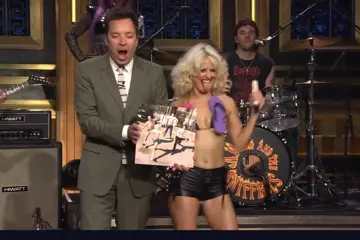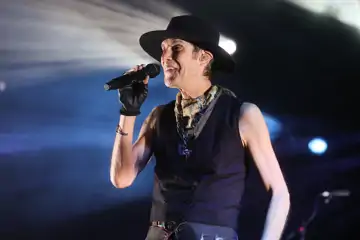Happy Valentine's Day! For you and your sweetheart, here's another documentary about the West Memphis Three and the Child Murders at Robin Hood Hills! Given Bruce Sinofsky and Joe Berlinger spent 20 years and 400 minutes chronicling the unjust convictions of the three Arkansas teenagers arrested for the 1993 murder of three children in backwoods Arkansas, one wonders why, exactly, that West Of Memphis needs to exist? One may say: to save new viewers a lot of time. Rather than sit through Sinofsky and Berlinger's exhaustive/exhausting documentary series - which is as wild and sensationalising as the regional media hysteria it seeks to critique - anyone wishing to study the story behind this counter-cultural cause célèbre can take in the very measured, thorough, and journalistic picture portrayed by Amy J. Berg. Berg's prior documentary, 2006's Deliver Us From Evil, was a scalpel-sharp skewering of the systematic cover-ups of sexual abuse in the Catholic church; making for able credentials at tackling this case, cinematically.
Berg was recruited by power-producers Peter Jackson and Fran Walsh, celebrity benefactors of the public push to free the West Memphis Three, to make this documentary. The pair appear herein: Jackson on camera, Walsh in recounted emails, and whilst their presence - and that of Natalie Maines, Eddie Vedder (singing, at one point, The Times They Are A-Changin', which is every bit as awful as it sounds), Henry Rollins, Patti Smith, Johnny Depp et al - may cause the more cynical to roll their eyes, the rock'n'roll-driven counter-cultural crusade to have the arrested youths-turned-middle-age-men freed was what, in the end, made all the difference.
Those lords of Hobbit-town didn't just bankroll this documentary, but poured piles of their personal finances into an independent investigation that effectively reopened a case that was an astonishing miscarriage of justice; an implausible narrative of bungling investigation, police railroading, coerced confession, smalltown superstition, media hysteria, and good old-fashioned witch-hunting; the three teens preyed on for their love of heavy metal when local moral panic suspected the killings as being part of Satanic ritual. Like Deliver Us From Evil, it's a portrait of a powerful institution callously covering their own hide; in which the careerist ambitions of supposed servants of the public good leads them to creating vast conspiracies of denial and repression. But, here, working from the change-making ken of Jackson and Walsh, Berg isn't just making an indictment of all that's been; uncovering the cover-ups of decades past. Instead, she's working as essential investigator, piecing together evidence in a way in which the Keystone Cops of rural Arkansas never thought to, or never wanted to; West Of Memphis a more perceptive procedural than any of the actual policework.
As with Paradise Lost 3: Purgatory, the final (well, at least so far) of Sinofsky and Berlinger's films, West Of Memphis invariably must end with the three defendants' eventual release from prison; and with the uneasiness of the resolved resolution. This isn't a heroic case of injustice overturned, the real killer - who, through all the evidence presented in West Of Memphis, becomes abundantly clear - righteously apprehended; instead, it's freedom via a weird technicality, where the state of Arkansas maintains their judicial correctness, the West Memphis Three plead guilty but are set free, and then the whole thing is never spoken of again. As much as the initial incorrect incarceration, this refusal to admit legal mistake serves as its own indictment of the American legal system. And, it's not like it's lost on its servants, either; the judge who grants the subjects their freedom describing the result as “tragedy on all sides”, with the years of imprisonment unable to be assuaged, this unanswered case now effectively - dissatisfyingly - closed, and, perhaps, the book finally shut on its cottage industry of documentaries.
After dabbling with Magical Negroes (2009's reprehensible The Soloist) and Action Heroines (2011's kookily-stylised, ultimately embarrassing Hanna), Joe Wright is back on familiar footing with Anna Karenina: making a period-piece with Keira Knightley. The pair collaborated, twice previously, only a pair of unexpectedly impressive pictures: 2005's Pride & Prejudice, which glowed with a familial warmth captured in endless instances of dappled sunlight; and 2007's Atonement, whose scathing Ian McEwan source text made for a film whose opening half - before it unfolded into a softly-lensed wartime romance that carried the waft of a perfume commercial - is an astonishing piece of taut cinema. Anna Karenina doesn't quite capture the tone of either, but it does allow the ambitious filmmaker a place from which to make a unique adaptation.
Though describing him as a 'visionary' filmmaker may be stretching it, Wright is definitely a filmmaker capable of keeping to a singular vision; and, here, his adaptation takes the complete opposite tack to, say, Andrea Arnold's ferocious Wuthering Heights, which threw away the fancy words of its classic-lit source and the frock-filled trappings of the period-piece, and revelled, rather, in rural, realist miserablism. Wright, instead, hurtles in the other direction; his film not just theatrical in its staging, but meta-theatrical; using the very idea of theatre as an eternal framing device. Each scene is played out on a series of sets that are constantly revealed to be such; their two-dimensionality never hidden, the curtains forever opening on each new scene. The action is passed from set to set, with choreographed shufflings of moving stages that take on a balletic quality as Wright's camera turns pirouettes, and vast ensembles of players prance to and fro. It's the dying days of the Russian Empire turned into a performance; the decadence, depravity, and scandalous adultery all akin to fiddling whilst Rome burns; Moscow society a stage on which the wealthy and entitled turn their lives into performance-art soap-opera; the essential falsity of presented social mores akin to the thespian's craft, the upper-classes willing players in a performance that allows them to remain in power.
It's a 'vision' that Wright continually pushes; showing not just the staginess of the stage-sets, but the working gears beneath them, the backstages in their shadows, the catwalks above them. Here, the underlings of the theatre —those who're tasked with making the production go; and, thus, presenting the stars in the right light/frock/place/set— are the underclasses, forever watching on at the drama on stage, the spectators that serve in absence of an audience. In a film in which every moment takes place in theatre's unreality, the backstages stand in for the 'real' world, the counter to the hyper-real world of the stage. In turn: there are moments where this hyper-real theatrical staging becomes meta-meta-theatrical; when, for example, curtains part on a play-within-the-play, only for the central drama to leap onto the stage; and be staged with extra added theatricality-upon-theatricality; Wright's 'presentation' starting to consume itself with the giddy gluttony of a film in love with its own vision.

Its overdetermined overstaging is about the theatre, sure, but there's as much reference to early cinema. In Anna Karenina, Wright - who played with actual light memorably at points of all his previous pictures - makes the determination to never catch actual sunshine, feel real snow, or inhabit a landscape existent. Instead, the film's entire world takes place indoors; as if all of Mother Russia is housed within the one gilded, opulent palace. In one beautiful, painterly scene in which Knightley and her star-cross'd lover Alex Taylor-Johnson revel in a moment of genuine happiness - the tragedy of their tragic love waiting, if only momentarily, in the weeds - as they lay about on a rug thrown over grass, bathed in Northern sunshine so white and so bright that the whole thing has a heavenly glow. But it's all, obviously, lights; all a piece of staging happy in its own staginess. This glow is all over the film: Knightboat and Kick-Ass lit up - and made up - like matinee idols, faces big and bright, foundation caked moondust thick, Wright gazing at them as astronomer upon astral bodies; the old-fashioned star-system alive and well in Imperial Russia. There's an emptiness to the devotion shown to their beauty; reflected in how uninspired a character our heaving hero is; Taylor-Johnson an object of devotion solely due to his baby blues and flaxen curls and waxed moustache; and, oh, I suppose, his indomitable romantic conviction. But rarely due to his characters: who is rich and handsome and in-uniform but (maybe deliberately?) essentially empty.
Any film that's an epic love-story about forbidden passion is, in these parts, instantly fighting an uphill battle; filmmakers usually naturally assuming that one scene of hammy pining set to heart-tuggin' strings is enough to get audiences cheering for consummated passions. Befitting a film that is presenting an opulence so opulent as to border on parody of opulence, Wright, thankfully, doesn't half-ass when working up to fevered pitch: making dance numbers or flights-of-fantasy or coitus montages feel as if they're about to explode; making stock symbols of stirring loins - the throbbing locomotive engines of desire; the fireworks of ecstatic feelings; a fluttering fan of a fast-beating heart; the swung scythe cutting a man's love down - feel like the most profound of illustrative imagery; using them as a conductor would instruments in an orchestra. He's just as good at wielding big, potent, high-symoblist symbols: garments cast asunder as strictures of society thrown off; a fallen horse shot dead as happiness lost; a room glowing electric-blue like some sci-fi igloo to paint ardour cooled. He, too, gives credence to the themes - and the social milieu - of the novel; with this not just being scandalous adultery in defiance of a repressive society, but a crime against God, an indiscretion that the heroine commits even in the belief - in the knowledge - that it's damning her to hell. Ultimately, though, this romance needs the convincing conviction of its paramour'd players, and, well, about that. Whilst Taylor-Johnson is a pretty, pretty face playing it cool, Knightley hews, of course, to the opposite end of the spectrum; there nothing quite so awful as her Rushun Chew accent and scenery-chewin' from the lamentable A Dangerous Mind, but still some of those stock moments of Knightboat-goes-c-c-c-crazy, which are hardly the stuff of suspended disbelief.
Yet, even if its epic-love-story-that-is-so-epic-you'll-probably-pass-out shtick doesn't quite work, there are blessed moments where Wright's ultra-theatricalised take gives rise on the actual Tolostoyan themes of the piece. Anna Karenina has an obsession with the superficial, athrill with revelry for every pearl and corset and billowing frock; for every taut waistcoat and follicle of flamboyant facial-hair; it so giddy with the luxury of brutes and belles and balls, twirling endless waltzes, that you wonder when the Revolution is actually going to get brewing; when this tragic heroine will take the Fall that symbolises the dying Empire; a tumble from grace for having chosen desire over virtue, lust over Godliness, the individual want over the common good. Inevitably, the “cruel spectacle” comes undone, and, on close, Wright ends with perhaps the best image in a film full of, well, at least excessive ones. It's of a theatre, of course: the film's eternal stage; but here the boards are warped, the seats buckled, the curtains tattered; the theatre now overgrown with wildgrass and flowers; the natural world finally arriving in Wright's unnatural one; Imperial Russia now a ruin, with the agrarianism of the people its newfound national identity. If you've just watched Florent Tillon's brilliant/haunting/of-the-times documentary Detroit Wild City (as I did, again, the other day), it's an image of astonishing contemporary resonance; making the implicit connection between the then and the now; this portrait of a decadent empire on the brink of collapse distracted by the 'scandalous' personal lives of its celebrity citizens not exactly a historical record of bygone times.















